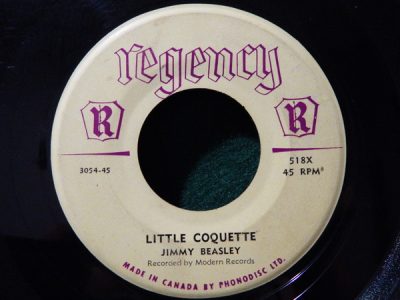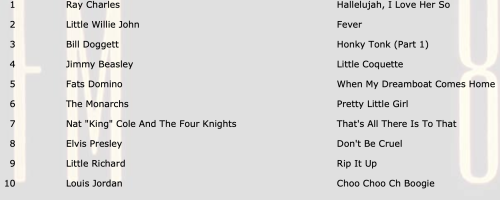#16: Little Coquette by Jimmy Beasley
City: Halifax, NS
Radio Station: CJCH
Peak Month: October 1956
Peak Position in Halifax ~ #4
Peak position in Vancouver ~ did not chart
Peak Position on Billboard Hot 100 ~ did not chart
YouTube: “Little Coquette”
Lyrics: “Little Coquette”
Jimmy Beasley was born in Kansas City, Missouri, in 1929. (Real Blues Magazine states he was born in 1929, while Wikipedia states he was born in 1931). Beasley was in several bands while in high school. But he also developed a talent for boxing. Between 1948 and 1950 he won 59 out of 65 fights vying for the Golden Glove competition. In 1954, Beasley was about to move to Los Angeles, when his band – The Sonny Kenner Trio – became the house band at the El Capitan Club at 18th and Vine in Kansas City. On one occasion, Billie Holiday showed up at the club and asked to sing with the trio. Upon moving to Los Angeles, Beasley got to know people in the music scene. For a semester he studied theology at Pepperdine College in Malibu, but quit before the year was through.
In Los Angeles, Jimmy Beasley joined King Perry’s band. He was in the studio for “Pitching A Party”, “Back To Kansas City” and several other sides for King Perry. Beasley subsequently recorded for Johnny Otis in 1955. In 1956, Jimmy Beasley released several of his own singles. “Ella Jane” and “Don’t Feel Sorry For Me” were Fats Domino-styled rockers. The latter got a lot of airplay in Los Angeles, and made the Top Ten on KUDL in Kansas City. The B-side of “Don’t Feel Sorry For Me” was a tune called “Little Coquette”.

In 1928, “Coquette” was written by Guy Lombardo’s brother Carmen Lombardo, Gus Kahn and Johnny Green. Carmen Lombardo was a jazz clarinetist, saxophonist, singer and composer. He was born in London, Ontario, in 1903. He wrote “Return To Me”, a #4 hit for Dean Martin in 1958 ranked at #10 for the year by Billboard. The single spent a dozen weeks in the Top Ten on the Cashbox Top Singles chart, peaking at #3 in June ’58. Carmen Lombardo also wrote “Powder Your Face with Sunshine”, a number-one hit for Evelyn Knight in March 1949. For many Americans and Canadians, New Year’s Eve was incomplete without hearing the strains of Guy Lombardo and the Royal Canadians over the radio, signing out the old year with “Auld Lang Syne” from the Roosevelt Grill in Manhattan. Guy Lombardo and the Royal Canadians played at the Roosevelt Hotel every winter from 1929 until 1962, missing only 1959. Carmen Lombardo died of cancer in 1971 at the age of 67.
Gustav “Gus” Gerson Kahn was born in 1886 in Koblenz, Germany. He wrote songs on Tin Pan Alley starting in 1916. He composed over 230 songs. Kahn’s best remembered tunes are “Ain’t We Got Fun?” (1921), “Carolina in the Morning” (1923), “It Had to be You” (1924), “See You In My Dreams” (1924), “Yes Sir! That’s My Baby” (1925), “Makin’ Whoopee” (1928), ”Love Me or Leave Me” (1929), “My Baby Just Cares for Me” (1930), and “Dream a Little Dream of Me” (1931).
John Waldo Green was born in 1908 in New York City. He composed the theme for the Betty Boop cartoons. Among the songs he penned, the most notable include “Out Of Nowhere” for Bing Crosby (1931), “Body And Soul” for Jack Hylton (1930) and “I Cover The Waterfront” for Eddy Duchin and His Orchestra (1933). Green’s band worked for The Fred Astaire Hour in 1936, and on recordings from 1935 to 1937. Johnny Green also was the musical director for The Jell-O Program Starring Jack Benny from 1935 to 1936. In 1949 he became the music director at MGM and was nominated 13 times for an Oscar at the Academy Awards. He won four times for Best Musical Score with Easter Parade (1949), An American in Paris (1951), West Side Story (1961) and Oliver! (1969).
After Guy Lombardo recorded “Coquette”, the song was subsequently recorded by Paul Whiteman and His Orchestra, The Dorsey Brothers, Rudy Vallée and His Connecticut Yankees, Django Reinhardt and Stephane Grappeli, Louis Armstrong, Nat “King” Cole, the Ink Spots, and others.
“Little Coquette” is a song about a gal that fools around and just makes fun of the latest guy who’s fallen in love with her. The song is written from the viewpoint of one former suitor whose heart was broken by Coquette. He predicts that one day she may fall in love with someone who plays with her heart the same way she played with his. And after her heart is broken by that anticipated event, the singer wonders if Coquette “when you are alone with all your regrets, you know, my little Coquette, I love you.”
“Little Coquette” peaked at #4 in Halifax (NS).
In January 1959, Fats Domino successfully covered Jimmy Beasley’s “Little Coquette”, and took it to #26 on the Billboard Hot 100.
In January 1957, Jimmy Beasley had #7 hit on CKFH in Toronto with the 1949 Ella Fitzgerald tune “My Happiness”. Beasley once again gave the tune a boogie-woogie piano musical arrangement. Two years later Connie Francis made the song a Top Ten hit in Canada, the UK and USA. In June 1957, Jimmy Beasley was back in the Top Ten in Toronto on CKEY 580-AM with “Jimmy’s House Party”. The instrumental, with a lot of ‘house party’ whooping it up in the background, recalled Bill Doggett’s “Honky Tonk Pt. 2”.
From 1957 to 1959, Jimmy Beasley headed a band that played for DJ Alan Freed in New York City. On Freed’s show, Beasley performed alongside Ray Charles, Fats Domino, Elvis Presley, Ruth Brown, Big Jay McNeeley and others. As well, Jimmy Beasley appeared on The Steve Allen Show on NBC, and the Al Jarvis radio show in Los Angeles. Beasley continued to release singles, including a boogie-woogie cover of the #1 hit in 1947 by Frances Craig “Near You”, and the 1948 Top 20 Kay Starr hit “You Were Only Fooling (While I Was Falling In Love)”. Beasley was also encouraged to record a cover of the Bobby Day penned tune “Little Bitty Pretty One”.
In 1961, Modern Records re-packaged a collection of Jimmy Beasley’s recordings in an album titled Twist with Jimmy Beasley. Two new tracks were recorded, “Slow Twist” and “Rhumba Twist”, to align with the ‘Twist’ craze at the time.
In 1998, Real Blues published a long article about Jimmy Beasley. It details how “In 1970, Beasley ventured onto the Nevada nightclub circuit with its gambling, easy living, and glitzy nightlife. He played Reno and Las Vegas, interspersed with bookings at a nightery in Laughlin, across from Bullhead City, Arizona. The people of Laughlin liked Beasley so well they would have erected a monument in his honor had he stayed. Having burned himself out on the Nevada club scene, Beasley became part owner of The Lama Room in Torrence (CA) where he entertained nightly for a decade before committing to semi-retirement.”
Over the decades, Jimmy Beasley played at jazz and blues festivals across the USA and in Europe.
April 1, 2024
Ray McGinnis
References:
“Don’t Feel Sorry For Me: The Jimmy Beasley Story,” Real Blues, Aug-Sept, 1998.
“El Capitan Club,” African American Heritage Trail.
King Perry, “Pitching A Party“, Hollywood Records, 1954.
King Perry, “Back To Kansas City“, Hollywood Records, 1954.
Jimmy Beasley, “Don’t Feel Sorry For Me“, Imperial Records, 1956.
Jimmy Beasley, “My Happiness“, Modern Records, 1956.
Jimmy Beasley, “Jimmy’s House Party“, Modern Records, 1957.
Guy Lombardo, “Coquette“, 1928.
Jack Payne, “My Baby Just Cares For Me“, 1930 (Gus Kahn lyrics).
Ben Bennie and His Hotel Roosevelt Orchestra, “Yes Sir! That’s My Baby“, 1925 (Gus Kahn lyrics)
Andrew L. Yarrow, “John Green, 80, a Film Composer and Arranger who Won 4 Oscars,” New York Times, May 17, 1989.
Bing Crosby, “Out Of Nowhere“, 1931, (lyrics by Johnny Green)
Jack Hylton Orchestra, “Body And Soul“, 1930, (lyrics by Johnny Green)
Eddy Duchin and his Orchestra, “I Cover The Waterfront“, 1933 (lyrics by Johnny Green)
Robert E. Tomasson, “Carmen Lombardo Dead at 67, Helped Lead Royal Canadians,” New York Times, April 18, 1971.
Evelyn Knight, “Powder Your Face With Sunshine (Smile! Smile! Smile!)“, 1948 (lyrics Carmen Lombardo)

CHNS 920-AM Top Ten | Halifax (NS) | October 6, 1956

Leave a Reply